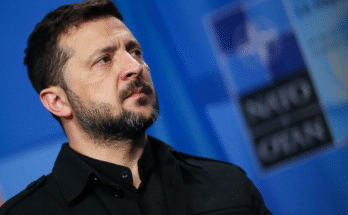Ursula von der Leyen’s leadership of the European Commission is facing significant challenges after her recent decision to withdraw a key “greenwashing” law. This move, seen as aligning with the far right, has severely strained the informal coalition of centrist pro-EU groups—the Socialists and Democrats (S&D) and the liberal Renew Europe—whose support is crucial for her major policy initiatives.

Policies Hanging in the Balance
Several critical policies could now be in jeopardy:
- Common Agricultural Policy reform: An overhaul of agricultural rules.
- New rules for deportations: Measures concerning asylum seekers.
- Revised environmental standards: A law aimed at simplifying green reporting requirements.
- EU’s seven-year budget: Though often downplayed, even these crucial negotiations could be affected.
These policies are known to cause deep ideological divisions, and without the backing of the Socialists and liberals, their future is uncertain.
The Shifting Political Landscape
For decades, the center-right European People’s Party (EPP), von der Leyen’s group, maintained an informal coalition with the Socialists and liberals. This arrangement ensured the EU’s stability and a moderate agenda. However, Brussels politics is now reflecting the right-wing shift seen across Europe. The EPP’s move further to the right has led to infighting, uncertainty, and mistrust within the EU’s core institutions.
Socialist MEP Tiemo Wölken expressed anger, stating, “The EPP are being irresponsible, using their position just to power play and it feels like they want to humiliate us.” Both centrist parties also accuse the EPP and von der Leyen of bypassing established EU legislative procedures, as the withdrawn greenwashing law was already in its final stages of negotiation.
Potential Backlash and Consequences
The fallout from this decision could see Socialist and liberal lawmakers intentionally slow down the legislative process, making it difficult for the Commission to advance its agenda. Richard Corbett, an EU expert and former U.K. MEP, suggests they could “make the Commission’s life difficult” by refusing to cooperate on files that far-right groups won’t support. A prime target could be von der Leyen’s top priority for her second term: reducing red tape related to climate targets.
René Repasi, leader of the German Socialists, warned that if von der Leyen continues to cater to the right-wing, the Socialists could trigger “tough” consequences for negotiations, particularly on the green reporting simplification package. He stressed, “Von der Leyen and the EPP [now] need to say that this action [the withdrawal of the anti-greenwashing bill] was an accident, and to remedy this within this week, otherwise the very foundation [of the coalition] is put into question.”
Centrist parties are frustrated that the decision effectively hands a victory to the right-wing in their efforts to dismantle parts of the flagship Green Deal. This comes despite von der Leyen relying on Socialist and liberal support to become Commission president initially. Liberal vice president Martin Hojsík emphasized, “If President von der Leyen wants to have a broader collaboration around the center…this is what she has to avoid.”
EPP’s Stance and Future Uncertainties
The EPP, however, argues that the Parliament’s composition has shifted right, giving them a mandate to pursue center-right policies and, if necessary, rely on far-right votes.
Beyond the Parliament’s dynamics, the waning influence of the center-left in national governments across Europe could paradoxically strengthen their hand in Brussels. With less to lose in their home countries, center-left groups might feel less constrained by government responsibilities and adopt a more oppositional stance, potentially complicating matters for the center-right-dominated Commission.
Despite the current friction, some politicians believe the informal coalition of the three centrist parties will ultimately hold together, as it serves their collective interests. Past instances show Socialists and liberals sometimes backing down from threats to distance themselves from controversial moves. Furthermore, the far right’s fundamental opposition to EU integration makes them an unreliable partner for crucial files like the bloc’s €1 trillion seven-year budget.
As EPP MEP Sigfried Mureșan, who leads budget negotiations, noted, “The cooperation of all pro-European voices is unavoidable. Otherwise, Europe will not have a budget for the next seven years, and that would be irresponsible.” The Commission has indicated it might reconsider the greenwashing bill’s withdrawal if Parliament and the Council agree to exempt small firms from compliance.


